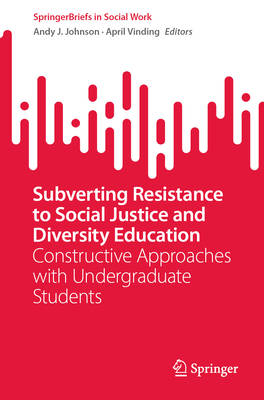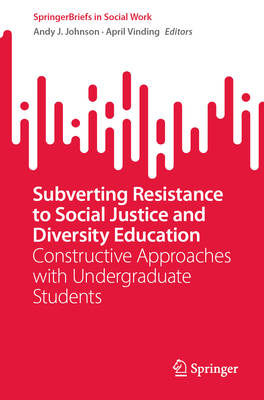
- Afhalen na 1 uur in een winkel met voorraad
- Gratis thuislevering in België vanaf € 30
- Ruim aanbod met 7 miljoen producten
- Afhalen na 1 uur in een winkel met voorraad
- Gratis thuislevering in België vanaf € 30
- Ruim aanbod met 7 miljoen producten
Zoeken
Subverting Resistance to Social Justice and Diversity Education
Constructive Approaches with Undergraduate Students
€ 42,45
+ 84 punten
Omschrijving
This compact book is constructed using psychological theory and research to empower university faculty to facilitate student engagement and address student resistance to diversity and social justice education more effectively.
University faculty teaching diversity and social justice have traditionally encountered various forms of student resistance. Recent cultural trends of political opposition to teaching critical race theory and other forms of increased polarization and scapegoating with decreased levels of social tolerance have exacerbated challenges in promoting student engagement in diversity and social justice education in universities and colleges.
In contrast to traditional models that tend to be confrontational in addressing student biases, the new Moving Towards Social Justice (MTSJ), Relational Partnership Development Model (RPDM) and process theoretical models seek to build on appropriate pre-existing strengths, interests, values, and the developmental readiness of students who might otherwise oppose learning about the contexts, lives, and predicaments of marginalized persons living in various intersections of gender, race, ethnicity, national origin, immigration status, sexual orientation, gender identity and ability/disability status. Emphasis is placed on the development of professional and life skills, such as wisdom and intercultural competence, which provide incentives and remove barriers to learning about social justice and diversity. Project-based learning approaches grounded in a developmental framework to foster the thriving and well-being of diverse students, collaborative partners in the community, and diverse persons served by the community partners are emphasized. The role of empirical assessment, feedback, and program refinement over time is also delineated within the models.
Subverting Resistance to Social Justice and Diversity Education: Constructive Approaches with Undergraduate Students is an indispensable and timely resource for university and college instructors who teach courses or have significant portions of a class that involve education around social justice, diversity, and intersectionality issues, such as cross-cultural psychology, multicultural psychology, social work, sociology, intercultural communication, and counseling or clinical practice with individuals or families from diverse social locations. University officers of diversity, faculty development providers, and other administrators interested in empowering university faculty to increase student engagement in social justice and diversity education also would find the book a useful reference.
University faculty teaching diversity and social justice have traditionally encountered various forms of student resistance. Recent cultural trends of political opposition to teaching critical race theory and other forms of increased polarization and scapegoating with decreased levels of social tolerance have exacerbated challenges in promoting student engagement in diversity and social justice education in universities and colleges.
In contrast to traditional models that tend to be confrontational in addressing student biases, the new Moving Towards Social Justice (MTSJ), Relational Partnership Development Model (RPDM) and process theoretical models seek to build on appropriate pre-existing strengths, interests, values, and the developmental readiness of students who might otherwise oppose learning about the contexts, lives, and predicaments of marginalized persons living in various intersections of gender, race, ethnicity, national origin, immigration status, sexual orientation, gender identity and ability/disability status. Emphasis is placed on the development of professional and life skills, such as wisdom and intercultural competence, which provide incentives and remove barriers to learning about social justice and diversity. Project-based learning approaches grounded in a developmental framework to foster the thriving and well-being of diverse students, collaborative partners in the community, and diverse persons served by the community partners are emphasized. The role of empirical assessment, feedback, and program refinement over time is also delineated within the models.
Subverting Resistance to Social Justice and Diversity Education: Constructive Approaches with Undergraduate Students is an indispensable and timely resource for university and college instructors who teach courses or have significant portions of a class that involve education around social justice, diversity, and intersectionality issues, such as cross-cultural psychology, multicultural psychology, social work, sociology, intercultural communication, and counseling or clinical practice with individuals or families from diverse social locations. University officers of diversity, faculty development providers, and other administrators interested in empowering university faculty to increase student engagement in social justice and diversity education also would find the book a useful reference.
Specificaties
Betrokkenen
- Uitgeverij:
Inhoud
- Aantal bladzijden:
- 86
- Taal:
- Engels
- Reeks:
Eigenschappen
- Productcode (EAN):
- 9783031317125
- Verschijningsdatum:
- 28/05/2023
- Uitvoering:
- Paperback
- Formaat:
- Trade paperback (VS)
- Afmetingen:
- 156 mm x 234 mm
- Gewicht:
- 154 g

Alleen bij Standaard Boekhandel
+ 84 punten op je klantenkaart van Standaard Boekhandel
Beoordelingen
We publiceren alleen reviews die voldoen aan de voorwaarden voor reviews. Bekijk onze voorwaarden voor reviews.










